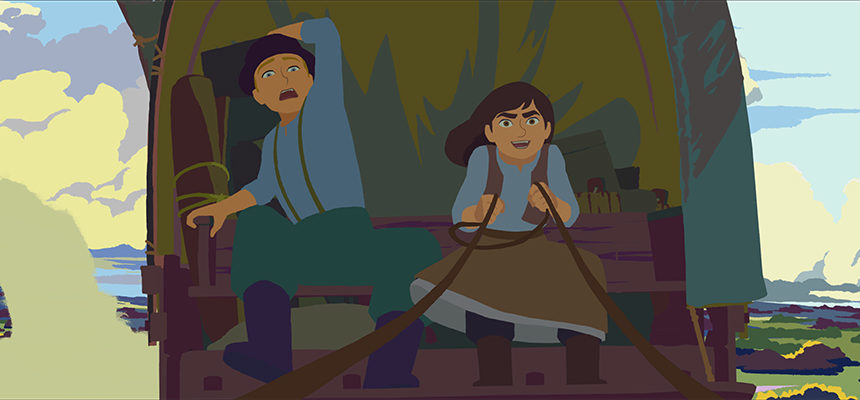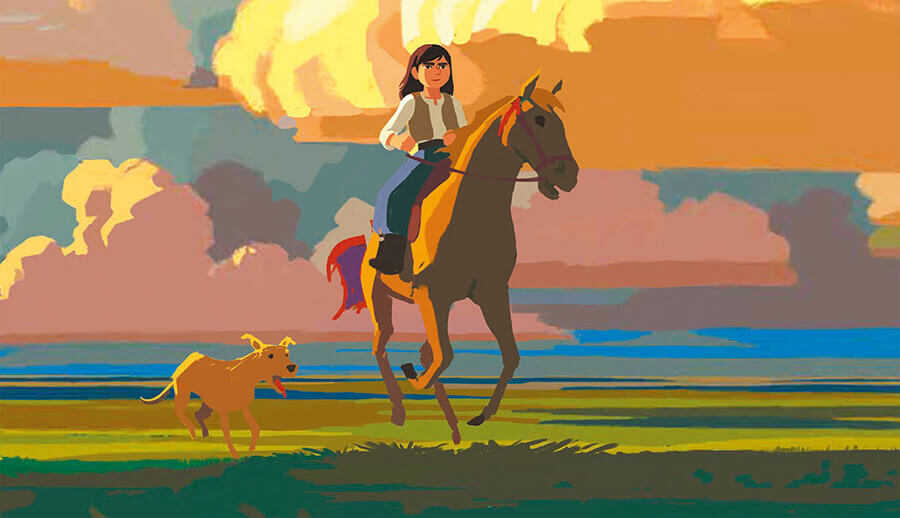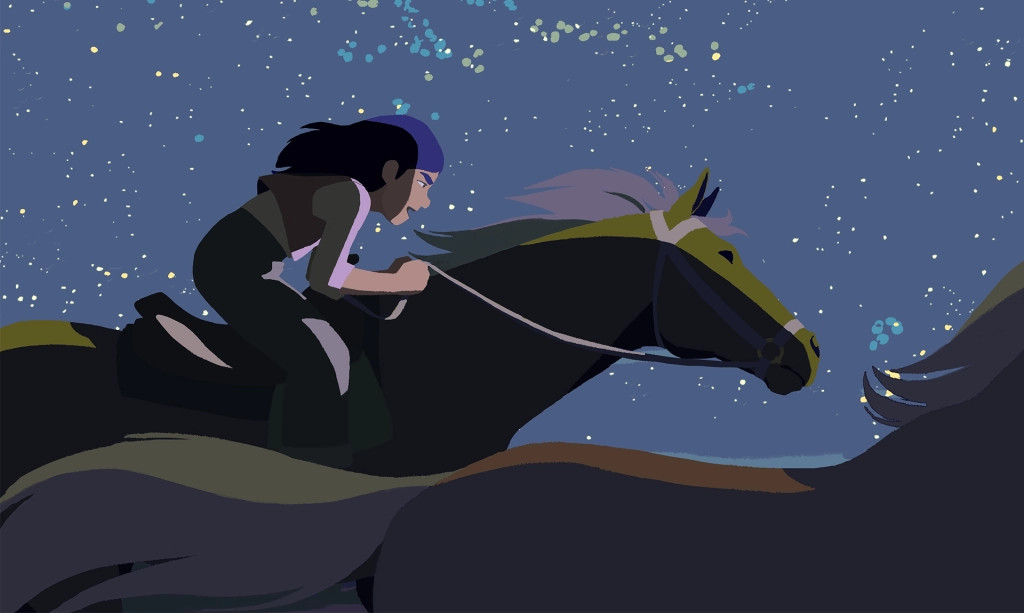Calamity (2020)

French director Remi Chayé (assistant director on Cartoon Saloon’s The Secret Of Kells) impressed with his 2015 debut feature Long Way North. Chayé returns with another period piece featuring a spirited young heroine, this time based on a real-life historical figure. Calamity is a fictionalised account of the childhood of the iconic Wild West figure Martha Jane Cannary- who would come to be known throughout the world as Calamity Jane.
Set in 1863, the story focuses on Martha as her family joined the wagon train across the American West. When her father is injured, Martha must learn how to drive the wagon and look after her family. But to do so, she must struggle against the strict gender norms of the time, where women and girls were not allowed to wear trousers, never mind drive a wagon train.
Calamity
was a selection for 2020’s Annecy International Animation Festival,
where it was awarded the prestigious Cristal for Best Feature. It was
subsequently released in French cinemas in October of the same year, and went
on to make its US debut as part of the 2021 Animation First festival.
The film was a co-production between Maybe Movies (Zombillenium,
Ernest and Celestine) and Denmark’s Norlum Animation,(Long Way North, Song Of The Sea). It has also been screened under the title Calamity Jane and Calamity, A Childhood Of Martha Canary (the direct translation of the film's official French title).
The film has now
been released in the US and UK on digital to rent and buy on major digital
storefronts including Amazon and iTunes. It is also available
streaming via the BFI Player platform in the UK.
If such an American story being told by a Frenchman seems odd, it’s worth
pointing out that certain parts of Europe have long had a fascination with all
things old west. It’s no mistake that some of the best westerns ever made were
from Italy of all places. Locally produced western comics have long been
popular in France, either in straight action comics or comedies like Lucky
Luke. Besides, it’s no stranger than an American or British film set in
France, Germany or Italy.
Chayé (who is this time, also
credited with the screenplay) is returning to familiar territory by centering
on a girl who refuses to be held back by the sexist attitudes of the time.
Like Long Way North’s protagonist Sasha, Martha is driven to break
these conventions by her love for her family. She faces resistance from
virtually everyone around her. Not only from those in authority and her father
(despite his injuries preventing him from looking after his family himself)
but also from her friends and peers. You can’t dress like that. Girls don’t
drive Wagons. That’s men’s work.
Martha wears a
near-permanent scowl for the early part of the film, and you’ll be right with
her. It’s hard not to feel righteous indignation at the sheer unfairness of it
all, and it only helps make our heroine easier to root for. The establishment
is best personified in the character of the Wagon Train’s stern leader. The
strict, cold and unsympathetic figure represents the authority that Martha is
rebelling against. With his towering black hat, he recalls (deliberately or
not) the dress worn by the puritans, the group who included the Pilgrim
Fathers, the founders of the original English colonies in America. Martha also
faces bullying from her peers.
It’s only through a chance
encounter with a wandering soldier named Samson that Martha meets an adult who
seems to take her seriously. After joining the caravan as a navigator, he
helps her drive the wagon and develop the skills to look after herself and her
family. After Samson disappears (along with several people’s valuables),
Martha takes off in hot pursuit in order to salvage what reputation she has-
and the true adventure part of the movie begins.
It’s here
that the film really discovers its sense of fun. With her hair cut short,
Martha is able to pass for a boy and suddenly finds new doors are open to her.
She runs into trouble with authority and locals but also encounters more
sympathetic folks: a young tearaway and a local independent businesswoman with
the fabulous name of Madame Moustache. It makes it feel a little less
like the entire world is hostile to poor Martha.
Calamity brings us some excellent set-pieces- exhilarating chase sequences and daring escapes. If the early part of the film is a bit of a downer, the latter part of the film leaves this far behind. The overall impression the film leaves you with is that it's just an enormous amount of fun- it’s a real crowd-pleaser in a way that Long Way North wasn’t. It should work extremely well for a young audience - at least those who are able to handle subtitles.
The visuals are an evolution of the style
seen in the director’s previous film. Hand-animated characters contrast with
flat, saturated backgrounds with a posterized style to produce a very striking
look. The lack of outlines gives it a very distinctive animation style- you
can recognise one of Chayé’s films at a glance. It's also somewhat style to the Cartoon Saloon- which is hardly surprising seeing as it shares staff with both Kells and Song Of The Sea.
The human characters are animated in a relatively simple hand-drawn style,
eschewing the smoothness of some other 2D animated feature. This slightly
rougher edge actually helps the characters feel more authentic somehow. Chayé manages to portray children in a realistic way that few other filmmakers
outside of Hayao Miyazaki have managed. Elsewhere, other elements of
animation has a smoother, more digital looking style: the movement of wagons
or carts. The animation on the animals seen in the film also deserves
attention. The movement of the horses are captured brilliantly; the dog that
Martha spends time with has real personality. It's all accompanied by a suitably rousing score (from composer Florencia Di Concilio). . And good luck with getting the irresistibly catchy theme song out of your head.
It could be
argued that the vision of the west seen in the film is one that owes more to
Hollywood than history. The real ‘Calamity Jane’ is a semi-mythological figure
though and many of the famous stories around her were made up- quite possibly
by Jane herself. Which makes telling a speculative tale about her youth seem
quite fitting.
Although the film is told from a feminist
perspective, and highly critical of the gender politics of the time, if you
are looking for an exploration of other problematic topics of the time then you
won’t find it here. First nations people are conspicuous by their absence for
the majority of the film- the only ones we encounter are stony-faced and
silent, and just someone else for Martha to run away from.
One
minor disappointment is the lack of an English-language dub, primarily because
it will prevent the film from reaching much of its intended young audience.
Secondly, because as previously hinted, this American story would just make
more sense in English. It’s a shame that its digital debut in the US and UK
came with no fanfare as it deserves much better than to be lost in the constant churn of new
content.
Regardless, Calamity is a captivating, visually
sublime yarn with a positive message for open-minded older children and an
adult audience. Calamity is one film that doen't live up to its name.




























